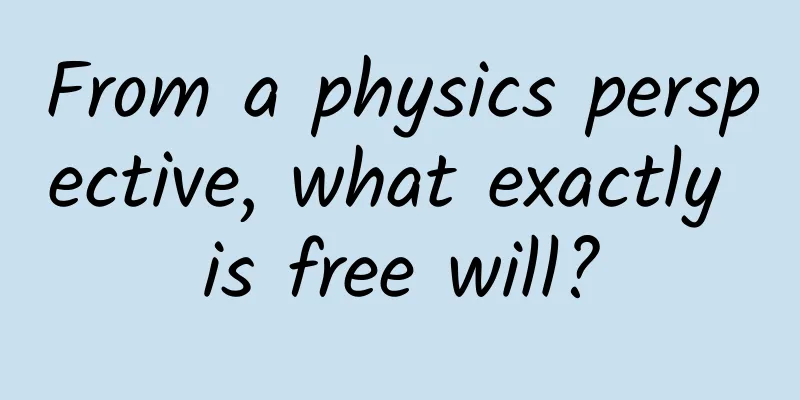From a physics perspective, what exactly is free will?

|
Recently, Columbia University physicist Brian Greene published a new book, Until the End of Time. As the subtitle "Spirit, Matter, and the Search for Meaning in an Evolving Universe" suggests, he seeks physical meaning in his journey through time starting from the Big Bang, and attributes the emergence and evolution of all things to a certain underlying deterministic thought. The author of this article also recommended Greene's new book, but still disagrees with many of his views, especially on "free will". In his view, physics cannot and does not need to explain free will, and free will also transcends physics. By Philip Ball Compiled by Dong Weiyuan Free will has always been a puzzle that physicists have found difficult to face. In physics, all events must follow deterministic laws of evolution exactly. Even quantum theory and thermodynamics, which are dressed in the guise of probability, are still completely deterministic in their core essence and cannot accommodate the existence of any free will. In his newly published popular science book Until the End of Time, the famous theoretical physicist Brian Greene said, "The reason why our choices seem free is that we cannot yet penetrate the profound disguises in the laws of nature, and our perception cannot truly touch the physical movement of elementary particles." Greene's insights seem to be interpreted as: we just naively feel that there seem to be different choices and consequences under the same conditions, but we do not actually have the mysterious power to intervene in the actual operation of the physical world. Many physicists hold a similar view to Greene: free will is just an illusory concept we use when talking about "higher-order events" such as human behavior. In fact, we cannot really prevent anything from happening. As spectators without any decision-making power, all we can do is to continue thinking and practicing under the spiritual suggestion of free will. This picture may be useful to you, or it may not be useful. However, according to this understanding, it doesn't matter whether it is useful or not. However, can those physical laws based on determinism really deny free will? I think many debates in this regard are wrong, and they are wrong from the very beginning. To quote Pauli, it's not even wrong. Many debates arise because the connection between cause and effect is not clearly understood, but the concepts of physics are over-generalized. This generalization has exceeded the boundaries of science and has become pure metaphysical conjecture. Physics should not be used to judge things outside its scope of application. Arrogance and absurdity In the late 4th century BC, the Greek philosopher Epicurus tried to reconcile the contradiction between human freedom of action and Democritus' atomic hypothesis. In the atomic hypothesis, the world is made up of atoms, and the movement of atoms is always governed by unchanging laws. Epicurus speculated that perhaps those atoms would undergo random changes in the process of movement, thus deviating from the constraints of determinism, so that they could avoid rigid fate to some extent. If these ancient views do not convince you, then the recent cognition from contemporary physics may not satisfy you. The chaos phenomenon in classical dynamics shows that it is a virtually impossible task to accurately predict the future, but the evolutionary process is absolutely deterministic. The result of wave function collapse in quantum measurement is non-deterministic - only based on our current understanding - but this non-determinism is completely and thoroughly pure randomness, which cannot accommodate the intentional direction that governs action. If we really have no free choice about the future, then psychology, sociology, and other disciplines that study human behavior seem to have become something empty and boring, even close to pseudoscience. All attempts to understand our behavior will be doomed to failure, and everything can only be attributed to the Big Bang. Neuropsychological research is nothing more than listing various brain patterns and the body movements that occur at the same time, but it cannot talk about the causal relationship between the two. Game theory is even more useless, because the behavior of players is not based on the current rules and conditions. These "sciences" have instantly become metaphysics like Zhou Gong's dream interpretation, which is led by illusions and hallucinations. And historical research is not much better, it is just a matter of inventing some rhetoric to pretend to explain the causes of historical events. When physics erased "free will" from the dictionary, it left a ruthless blank. It did not provide any alternative options for how we can understand and predict behavior through observation. This is really a bitter dilemma. In order to save the face of other disciplines, let us temporarily escape from physics and think in a different way. For example, from the perspective of psychological research, there is a causal relationship between human will and behavior, and this relationship can be recognized. So we can propose various hypotheses and empirically screen the more reliable ones through experimental verification. More importantly, through these cognitions, we can also change human behavior. There should be nothing wrong with the latter way of thinking. Do we have to oppose it to the deterministic concept of physics? No, this is not an either-or question. As mature researchers, we should choose to have it all. The key is to clarify the applicable field and scope of knowledge. When we use reductionism to explore the causes of certain phenomena, this attribution must stop at some appropriate level, rather than endlessly attributing it to the Big Bang. It is also important to note that each theory has its "range". When it exceeds this range, the theory itself is not wrong, but it has lost the power to explain the world. The reason for the failure of the theory is not too many parameters or too complicated calculations, but a more fundamental incompleteness. Imagine such a scene: 10^30 elementary particles in continuous thermal motion, each particle has moved thousands of kilometers away from the initial position within a few hours, but still maintains a distance of no more than 2 meters between each other. From a physics point of view, this is simply a miracle that cannot happen. But in fact, the scene just now is just describing a long-distance traveler. There may be many reasons for his travel, but no explanation comes from the level of quantum theory. Greene's view that the world is divided into many layers, and the mechanisms at the bottom provide explanations for the phenomena at the upper layers, is obviously wrong. If biological evolution and sociology are also regarded as superstructures based on physics, then the arrogance of "big physicsism" is almost as absurd as its absurdity. Chimpanzee Physics Physicists with a skeptical spirit may ask: Where does the "free will" that can change the original fate of things come from? Faced with this question, I would like to ask: What factors determine the original fate of things? This involves the reductionist attribution thought behind the phenomenon. This thought is of course time-tested, but it may not necessarily give a complete answer. Why are there chimpanzees on Earth? Well, it's because of the Big Bang. Yes, the Big Bang produced the basic particles needed to form chimpanzees, but that is only a necessary but not sufficient condition. To understand chimpanzees, we need to consider the impact of the living environment and random genetic mutations on their evolutionary process. These influencing factors form a kind of "force" that drives the arrangement of various substances in the chimpanzee's body. However, this "force" is different from the force in physics in that it can form a self-causal closed loop. Although these "forces" are also composed of several sub-layer phenomena and have rich and small structures, they generally only form causal relationships within this level and do not need to and cannot be attributed to the sub-level. Therefore, at the bottom of the chimpanzee evolution phenomenon, there is no "chimpanzee physics" to support its explanation, and all the causes of evolution come only from this level itself. In fact, even in physics, some properties of complex systems often cannot be attributed to sub-layers. Philip Anderson, a Nobel Prize winner in condensed matter physicists, once said: More is different. Even if we have the ability to reduce everything to basic laws, it does not mean that we can build the universe based on these basic laws. "He clearly pointed out that the behavioral characteristics of complex systems composed of a large number of particles are not simply extrapolated from small-scale systems. Every time the scale and complexity of the system go up a level, some new phenomena and properties will appear, which are worth our re-examination. The new properties that emerge in these complex systems are no less fundamental than the underlying basic laws. " There is no free will in microphysics Now we can say frankly that there is no free will in the microscopic physical world. This is a concept at the level of psychology and neuroscience. The conscious subject makes one or another decision response to a situation with multiple choices through sensory perception and other types of neural stimulation information. The phenomenon of free will only appears in the nervous system composed of a large number of neurons, and has nothing to do with the movement of elementary particles. Naturally, there is no need to resort to the mysterious power that Greene mentioned that intervenes in the underlying physical world. The origin of free will comes from the biological evolution process. During the long evolutionary process, the brain has been gradually instilled with a series of decision-making-related operating mechanisms, including both innate decision-making tendencies and incentive mechanisms that reward acquired learning and information processing capabilities. It can be seen that the language system used to describe this set of operating mechanisms is significantly different from the language system of Newtonian mechanics or quantum theory, and there is almost no intersection between the core noun concepts used in the two systems. Since we can use the language system of neuroscience to properly analyze and describe, there is no need to use Hamiltonian or Hermitian operator to force an explanation. Since the early 19th century, when Laplace imagined an omnipotent demon that could calculate all the details of the future evolution of the universe, the seemingly existing conflict between determinism and free will and the resulting debates have continued to this day. However, these lively debates have rarely made direct contributions to our cognitive improvement. In my opinion, the development of neuroscience has explained free will very well. We just need to clearly identify the boundaries and prevent the deterministic ideas in the laws of physics from endlessly spreading to places where they have no say. Otherwise, the content of the debate can easily deviate from rational common sense and enter the metaphysical world. Just like the "thing-in-itself (Ding-an-sich)" in Kant's philosophy that exists but can never be perceived by the senses, although it is an interesting topic for discussion, it is not science after all. Original link: https://physicsworld.com/a/why-free-will-is-beyond-physics/ |
<<: What is green and healthy laundry detergent? How to use laundry detergent
>>: Is sorghum rice a coarse grain? What is the common name of sorghum?
Recommend
Early symptoms of uterine fibroids
Generally speaking, uterine fibroids are benign t...
Why do women cross their legs?
In modern society, people may not have too many r...
Can eating rice like this help you lose weight? Are you tempted?
I heard that cooling down cooked rice, steamed bu...
Beware! Long-term acid reflux may lead to esophageal cancer
According to statistics, one in five people has e...
How can patients with liver disease nourish their liver in autumn? Recommendations for autumn conditioning for patients with fatty liver, please bookmark
In recent years, with the improvement of people&#...
What is the reason for the red spots on the pregnant woman's belly?
A woman's immunity will be particularly low d...
When vertigo occurs, what should you pay attention to when using betahistine and in what situations should it not be used?
A friend told Huazi that she had vertigo recently...
What causes nosebleeds during menstruation?
Healthy maintenance is particularly important for...
Maintenance after fallopian tube removal
If you find yourself suffering from fallopian tub...
Can I test for pregnancy after a few days without having my period?
Under normal circumstances, menstruation is very ...
Dull pain above left breast
After a woman has experienced pregnancy and child...
What are the symptoms of acute stroke? What are the sequelae?
1. What are the early symptoms of stroke? See the...
What are the main reasons for women's feet sweating?
In life, there are many ladies who sweat a lot on...
Why I didn't get pregnant during ovulation?
The ovulation period is the time when a woman'...
What is the cause of accessory breast swelling and pain?
Women's bodies will undergo very obvious chan...









